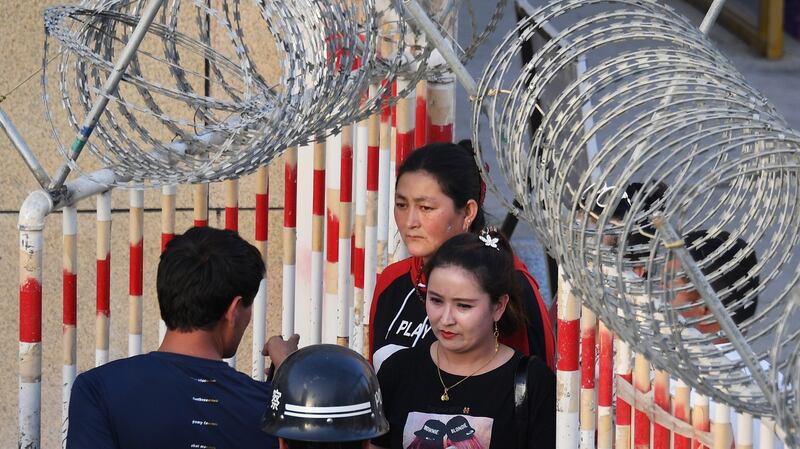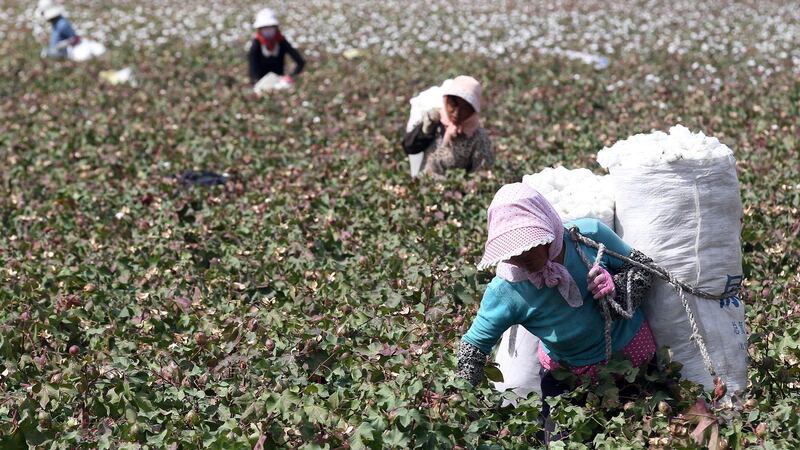Updated at 1:35 p.m. ET on 2021-04-19
China’s treatment of Uyghurs and other Turkic Muslims in the Xinjiang Uyghur Autonomous Region (XUAR) meets international legal definitions of “crimes against humanity” and merits a U.N. inquiry, sanctions and efforts to prosecute responsible officials, human rights researchers said in a report Monday.
“Since at least 2014, the Chinese government has subjected Turkic Muslims to various crimes against humanity, including mass arbitrary detention, torture and deaths in detention, and enforced disappearances,” said Human Rights Watch and the Stanford Law School Human Rights & Conflict Resolution Clinic.
Researchers evaluated Chinese practices toward Turkic Muslims – mostly Uyghurs, but also Kazakhs and Kyrgyz – against crimes against humanity criteria under Rome Statute of the International Criminal Court, the treaty that set up the International Criminal Court (ICC), and came into force into 2002.
The Rome Statute defines crimes against humanity as specified acts “committed as part of a widespread or systematic attack directed against any civilian population, with knowledge of the attack,” the HRW/Stanford report notes.
The report says the four criteria are that:
-the attack is “widespread or systematic”;
-the attack is directed against a “civilian population”;
-the acts are committed “with knowledge of the attack”;
-the acts are “pursuant to or in furtherance of a State or organizational policy to commit such attack.”
HRW researchers and those from the Stanford rights clinic reviewed official documents, witness testimony and other evidence from “Strike Hard Campaign against Violent Terrorism” launched by Beijing in the XUAR in 2014, and found conditions meet the Rome criteria.
“The government’s mass incarceration of a million Turkic Muslims across the Xinjiang region meets the requirement of a 'widespread or systematic' attack,” said the report.
“Turkic Muslims living in the Xinjiang region constitute a specific civilian population. Internal documents disseminated among CCP officials that reference key elements of the crimes targeting the Turkic Muslims—such as “assault style reeducation” of uncooperative detainees—illustrate the Chinese authorities’ knowledge of the attack,” it said.

Cover up shows organization
The fourth requirement “requires that the State or organization actively promote or encourage such an attack against a civilian population,” the report notes.
“The accounts of former detainees held at different facilities and during different time periods — such as the repeated allegations of the use of a ‘tiger chair,’ forced political indoctrination, and cultural erasure, as well as similarities in detention conditions — are strikingly similar, which indicates the existence of an organized policy,” says the report.
“The Chinese government’s insistence on and enforcement of secrecy shows a high degree of centralized control over the camps, and an institutional awareness of the need to cover up their internal workings,” it adds.
Chinese acts “implicate the following crimes against humanity: murder; enslavement; imprisonment or other severe deprivation of physical liberty in violation of fundamental rules of international law; torture; persecution; enforced disappearance; and other inhumane acts,” said the report.
The HRW/Stanford report notes that since January, the U.S. State Department and the parliaments of Belgium, Canada, and the Netherlands have determined that Chinese policies in the XUAR constitute “genocide” under international law.
“Human Rights Watch has not documented the existence of the necessary genocidal intent at this time,” it says.
“Nonetheless, nothing in this report precludes such a finding and, if such evidence were to emerge, the acts being committed against Turkic Muslims in Xinjiang — a group protected by the 1948 Genocide Convention — could also support a finding of genocide.”
HRW notes that China’s U.N. Security Council permanent membership gives it veto power over Council action. China – along with India, Indonesia, Russia, Turkey and the U.S. — are among major states that are not parties to the ICC.

Commission of Inquiry
The New York-based rights watchdog recommends that the U.N. Human Rights Council adopt a resolution to create a Commission of Inquiry to investigate allegations of crimes against humanity and other abuses against Turkic Muslims in the XUAR, make recommendations to end the abuses, and identify responsible officials and ways to holding them accountable.
“The U.N. secretary-general should publicly voice support for a Commission of Inquiry into human rights violations in Xinjiang, and publicly and privately urge Chinese authorities to end abuses against Turkic Muslims in Xinjiang. The secretary-general should publicly express support for accountability for those responsible for crimes against humanity in Xinjiang,” says the report.
Such commissions have been empowered by the U.N. to investigate atrocities in places including Darfur in the Sudan, Libya, Syria, North Korea and the Central African Republic.
Concerned countries should work collectively to “impose visa bans, travel bans, and targeted individual sanctions under the U.S. Global Magnitsky Act, the EU Global Human Rights Sanctions Regime, and other human rights sanctions regimes in place in Canada, the United Kingdom, and elsewhere,” it says.
Those countries’ government agencies “should review all investments in Xinjiang and, where necessary, impose trade sanctions, including divestment, in sectors facing credible allegations of serious abuses such as forced labor,” says HRW.
Businesses and investors around the world should conduct “human rights due diligence” under U.N. guidelines and join global efforts to trace and end the practice of forced labor in the XUAR, it says.
The HRW/Stanford report also offers recommendations to countries, such as Turkey and Kazakhstan, that are home to XUAR exiles and have come under pressure from China to repatriate Uyghurs and others.
Those countries should grant Turkic Muslims “access to a fair system for adjudicating asylum requests, facilitate family reunification by allowing family members of Turkic Muslims to join them, [and] end all refoulement and other direct and indirect forced returns of Turkic Muslims to China,” the report says.

Controlling the narrative on Xinjiang
Authorities are believed to have held up to 1.8 million Uyghurs and other Muslim minorities accused of harboring “strong religious” and “politically incorrect” views in a vast network of internment camps in the XUAR since 2017 and have jailed or detained hundreds of Uyghur academics and other influential members of the ethnic group in recent years.
While Beijing initially denied the existence of the camps, China in 2019 changed tack and began describing the facilities as “boarding schools” that provide vocational training for Uyghurs, discourage radicalization, and help protect the country from terrorism.
But reporting by RFA’s Uyghur Service and other media outlets suggest that those in the camps are detained against their will and subjected to political indoctrination, routinely face rough treatment at the hands of their overseers and endure poor diets and unhygienic conditions in the often-overcrowded facilities.
In recent months, Beijing has sought to undermine reports on abuses through a coordinated campaign to control the narrative on the situation in the XUAR. Methods include government officials and celebrities glorifying life in the region on social media, state media broadcasts highlighting the threat of "terrorism" or include "testimonies" by relatives of exiled activists who appear coerced into slandering their family members, and most recently, a new musical film called "The Wings of Song" which touts the benefits of cultural assimilation in an idealized society under Beijing's rule.
Conveniently omitted is imagery of internment camps and other detention centers, Uyghurs being packed into trains and sent to forced labor details, and a pervasive security system comprised of high-tech digital surveillance and regular checkpoints where Turkic Muslims are forced to produce identification and submit to searches.
Amid increasing international scrutiny, Beijing has faced a growing call for unfettered access by independent monitors to investigate reports on the situation in the region.
China in 2019 organized two visits to monitor internment camps in the XUAR—one for a small group of foreign journalists, and another for diplomats from non-Western countries, including Russia, Indonesia, Kazakhstan, and Thailand—during which officials dismissed claims about mistreatment and poor conditions in the facilities as “slanderous lies.”
During the U.N. General Assembly in New York in September last year, U.S. Deputy Secretary of State John J. Sullivan told the gathering that these trips and the China-friendly accounts they produced were “Potemkin tours in a failed attempt to prove” that the camps were humane training centers.
The report documenting Chinese actions in the context of international law is "crucial at this moment," said Rushan Abbas, executive director of the Campaign For Uyghurs, a Washington-based advocacy group.
"As Beijing is spreading propaganda videos and disinformation to deflect from these atrocities and trying to justify them with lies, it should be crystal clear to the world that what the regime is doing is morally bankrupt," she said in a statement.
"With each acknowledgment of the reality of the crimes against the Uyghur people, we are one step closer to justice, but there is a long road ahead," said Abbas.
